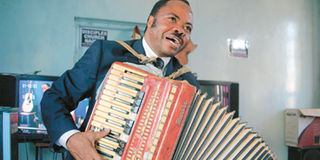Faces of the golden age of gospel music

Faustin Munishi plays his trademark accordion in his studio. The Tanzanian government banned his song CCM imezeeka. Photo/HEZRON NJOROGE
Lovers of gospel music today look back at the 1990s as the golden age.
This was when Japheth Kassanga, Shari Martin, Faustin Munishi and Mary Atieno, among other singers, were riding high in the charts with their compositions.
It was also a time when Kenya Broadcasting Corporation (KBC) was the only broadcaster, making airplay a very competitive affair. That notwithstanding, the songs by these artistes received massive airplay, competing favourably with secular songs on radio.
These songs were on every person’s lips. However, the advent of FM stations and the attendant revolution brought with it a fresh crop of artistes, and the gospel artistes of yesteryear would appear to have been shunted aside.
Today, the mention of their names rarely elicits any recognition among the youth. Yet you would be wrong to think they have sunk into oblivion.
Lifestyle found out that though most of these artistes are not into active composition and performance of music; they have not relinquished their passion.
Shari Martin, for one, is based in Mombasa, where he has set up a recording studio called Royal Sounds.
“I spend most of my time in the studio,” he says, adding that, apart from trying to nurture up-and-coming artistes, he has been redoing his past songs, some of which, he says, were not properly done.
However, he is quick to point out that music, to him, still remains a hobby. And that explains why he still works in the hospitality industry to date.
The Utalii College-trained Martin rose to fame in 1991, courtesy of his hit song Tangazo la Ajabu. He tells of how he nearly lost that song when a friend “stole” it.
He had come to Nairobi to record what was to be his debut album, when he somehow misplaced the cassette, in which he had recorded his songs. “Little did I know that the friend who had accommodated me was the one who had stolen it,” recalls Martin. He says he only realised his loss when he saw the said friend singing it on television.
He nevertheless reclaimed his music and the album went on to become a national hit. Other notable albums from him include Christmas Christmas, Nimekutambua Shetani and Rafiki Pesa.
His last job was in a major hotel in Naivasha, where he was the head chef. He has also worked as a food and beverage manager and entertainment director in various hotels around the country.
“Right now I am in the studio working on an album, which should be out in April,” says Martin, who has worked in the hotel industry for 30 years now.
He blames the fading popularity of local music to the entry of “cheap foreign music dumped into the local market”.
On his part, Faustin Munishi is still smarting from the effects of his last album, Mpende Adui, released in 2000. This album had, among other songs, CCM Imezeeka and Nawaombea Wanahabari, controversial songs that did not endear him to certain quarters, especially in his native Tanzania.
The first song, which was an indictment on the Ujamaa socialist policy in Tanzania, drew the instant wrath of the Tanzanian government, which promptly banned it.
“I was simply saying that Ujamaa had failed in Tanzania, which is the truth,” the Nairobi-based singer-cum-producer says. “Vendors caught selling the album in Tanzania were arrested and the music confiscated.”
Munishi says that following the crackdown, he went to Tanzania and dared the authorities to arrest him as the song’s composer, “but they could not do it.”
Targeted the media
In Nawaombea Wanahabari, Munishi had targeted the media, accusing them of, among other things, contributing to the rot in society.
“To my surprise, the media also banned me,” he says. “Clearly, you people were not happy with my criticism.” He explains that his songs mostly contain social awareness messages.
“That is why I will not hesitate to sing about anything as long as it affects the society, no matter how controversial it appears to be,” he adds.
Munishi is today busy in his studio in River Road, Nairobi reworking his past songs, converting them into digital formats, both audio and video.
But he still has some issues with the media, accusing them of giving “underserved” publicity to up-and-coming artistes at the expense of the older artistes.
“If some of us could have even half of the publicity you give the young artistes, then we would have real celebrities in Kenya today,” he says with a smile.
Japheth Kassanga supports his peer’s sentiments, saying the young gospel artistes need to put their act together.
“I cannot rate the young gospel artistes,” he says. “Their idea of making music is releasing a single and thinking that they have made it.” He says there is more to music than producing a single, being applauded by peers and dominating airplay in FM stations.
“These young people rarely release albums. If you visit my music shop along Moi Avenue (in Nairobi's city centre), you will get to know which music really sells,” says Kassanga, who nurtured artistes like Esther Wahome and Reuben Kigame.
Kassanga, who also runs Hit Score Studios in KPCU, along Haile Selassie Avenue, says the quality of gospel music has gone down, something he attributes to the fact that most artistes are today taking on the roles of singer, composer, songwriter, producer and marketer.
“For music to attain professional standards, these roles have to be performed by qualified people,” says Kassanga who, together with his wife, shot to popularity with their 1990 album Maisha ya wanadamu.
Although he last released his music 10 years ago, Kassanga still performs at crusades and in church. He heads the department of Praise and Worship at the AIC Jericho. However, he hopes to brush dust off his guitar and release a new album some time next year.
When she is not singing, Mary Atieno, she of the Adamu na Eva fame, teaches literature and Chrisitan Religious Education at Buru Buru Girls’ High School in Nairobi. Her husband, Alex Ominde, told Lifestyle that they have their church, Sanctuary of Hope in Kayole, where they preach and sing.
He added that they have bought studio equipment and hope to establish a recording studio soon. Together, they have recorded two albums at Kassanga’s studio, which they hope to launch next month.




